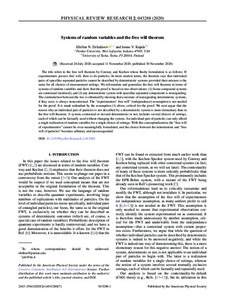Systems of random variables and the free will theorem
Janne V. Kujala; Ehtibar N. Dzhafarov
Systems of random variables and the free will theorem
Janne V. Kujala
Ehtibar N. Dzhafarov
AMER PHYSICAL SOC
Julkaisun pysyvä osoite on:
https://urn.fi/URN:NBN:fi-fe2021042827289
https://urn.fi/URN:NBN:fi-fe2021042827289
Tiivistelmä
The title refers to the free will theorem by Conway and Kochen whose flashy formulation is as follows: If experimenters possess free will, then so do particles. In more modest terms, the theorem says that individual pairs of spacelike separated particles cannot be described by deterministic systems provided their mixture is the same for all choices of measurement settings. We reformulate and generalize the free will theorem in terms of systems of random variables and show that the proof is based on two observations: (1) Some compound systems are contextual (nonlocal), and (2) any deterministic system with spacelike separated components is nonsignaling. The contradiction between the two is obtained by showing that a mixture of nonsignaling deterministic systems, if they exist, is always noncontextual. The "experimenters' free will" (independence) assumption is not needed for the proof: It is made redundant by the assumption (1) above, critical for the proof. We next argue that the reason why an individual pair of particles is not described by a deterministic system is more elementary than in the free will theorem. A system, contextual or not and deterministic or not, includes several choices of settings, each of which can be factually used without changing the system. An individual pair of particles can only afford a single realization of random variables for a single choice of settings. With this conceptualization, the "free will of experimenters" cannot be even meaningfully formulated, and the choice between the determinism and "free will of particles" becomes arbitrary and inconsequential.
Kokoelmat
- Rinnakkaistallenteet [19207]
